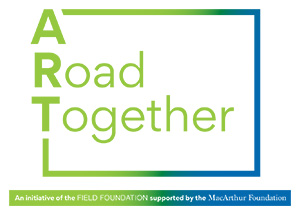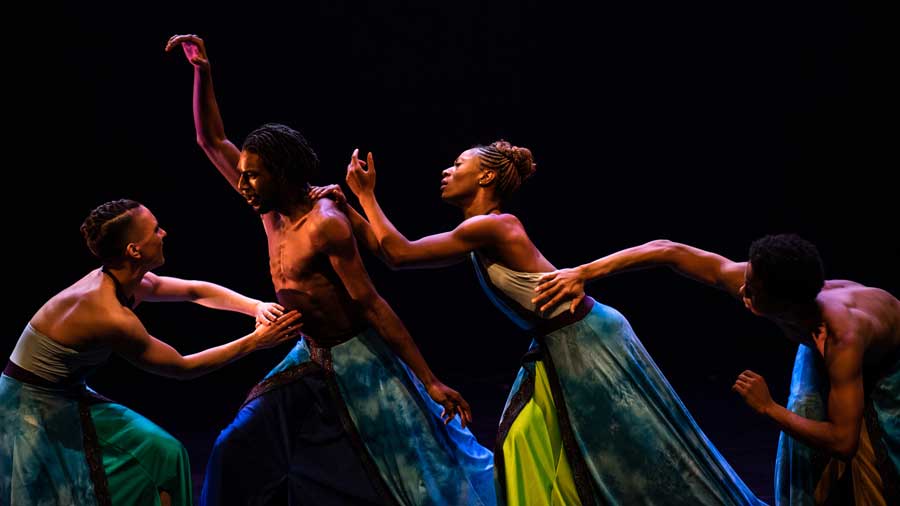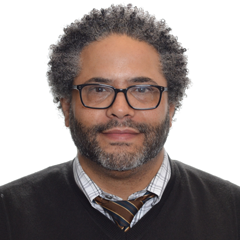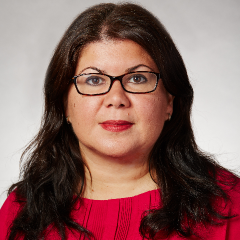Geoffrey Banks, Senior Program Officer, and Sandra Aponte, Program Officer, share our new regranting partnership with the Field Foundation to offer general operating support to small and mid-sized arts and culture organizations with a strong commitment to equity.
“Not everything that is faced can be changed, but nothing can be changed until it is faced.”—James Baldwin

It is an honor and privilege to announce the launch of A Road Together (ART), our new regranting partnership with the Field Foundation.
As a private and independent foundation, Field awards grants to organizations and leaders working in the areas of Art, Justice, and Media & Storytelling to help address systemic issues in Chicago’s diverse and historically underserved communities. Over the next five years, through ART, Field will regrant MacArthur funds to offer general operating support to small and mid-sized arts and culture organizations with a strong commitment to equity.
Through this regranting partnership, we aim to see a more equitable distribution of MacArthur’s Chicago Commitment resources across the city’s geographies and populations and greater diversity in the organizations that MacArthur supports overall. The ART grantmaking program aligns with our goal to invest in people, places, and partnerships to advance racial equity and build a more inclusive Chicago.

Chicago's Deeply Rooted Dance Theater, "Heaven", featuring Rebekah Kuczma, Ricky Davis, Dominique Atwood, Ahmed Hill.
The long road to this new partnership began more than four years ago. We made a fundamental change to the Chicago Commitment strategy by ending MacArthur’s legacy Arts and Culture in Chicago grantmaking program and established a distinct program in its place called Culture, Equity, and the Arts (CEA). Field’s illuminating heat maps showed geographic funding disparities for arts organizations across the city of Chicago that informed our thinking during the design of the CEA program. At the same time, we established a parallel partnership with Field for the Leaders for a New Chicago Award, which offers “no-strings attached” monetary awards to amplify the voices of diverse community-based leaders, including Chicago’s artists and cultural producers.
CEA represents a significant departure from MacArthur’s historic approach to investing in Chicago’s arts and culture sector. While the previous Arts and Culture program was conceived as a “civic contribution to Chicago,” the CEA program applies a set of grantmaking criteria with an equity lens, aims to shift power by employing a participatory grantmaking approach, and no longer links the amount of a grant to the size of an organization’s annual budget. To date, these fundamental changes have only applied to MacArthur’s direct portfolio of grants, comprised of large organizations with annual budgets of $2 million and above.
We see this as a critical moment to make a bold change to the Chicago Commitment strategy.
We see this as a critical moment to make a bold change to the Chicago Commitment strategy. The persistence of systemic racism in Chicago, exacerbated by the COVID-19 pandemic and police killings of Black Americans, brought renewed urgency to our commitment to press for a more racially equitable city.
Amid the pandemic, our evaluation and learning partner produced a technical report that challenged our thinking about our efforts to advance racial equity in and through the arts, such as broadening the notion of what counts as art. We were compelled to explore how our regrantees have worked to achieve greater equity by creating the space for more stories to be told. We were inspired to expand our definition of “arts organizations” to include groups that are organizing for social change and social service organizations that use the arts to reach historically underserved audiences. Through ongoing conversations with the arts sector and the communities it serves, we were also urged to examine the demographics of the organizations we support and to make tactical refinements to our participatory grantmaking process, all to further our efforts to level racial disparities in the arts and culture sector.
Field’s vision for the ART program is aligned with our goal in the Chicago Commitment strategy. Field plans to: prioritize funding to South and West Side organizations, as well as organizations led by people of color and serving communities of color; invest in the sustainability of smaller organizations with unrestricted support and multi-year funding; share power through participatory grantmaking; and keep the sector informed through publications and reports. MacArthur’s investment will enable Field to significantly increase its capacity to offer general operating grants, place greater emphasis on unrestricted multi-year support, and build its own staffing and operational needs to manage the ART program.
Our aim is to make a meaningful contribution to address complex inequities in Chicago by acting in collaboration with others.
Specifically, Field will regrant MacArthur funds to offer multi-year general operating grants recommended through a participatory grantmaking process. Field will also offer single-year general operating grants outside of the participatory process. In addition, Field will use MacArthur funds to convene its grantee partners to network, form new and stronger relationships, and foster innovation and collaboration among artists, organizations, and collectives.
The ART program with Field is a multimillion-dollar investment in Chicago's arts and culture sector made by MacArthur as part of Culture, Equity, and the Arts. In this way, and as we shared last year, MacArthur will continue to support small and mid-sized arts and culture organizations with multi-year unrestricted funding, and we remain steadfast in our commitment to advancing racial equity in and through the arts. Field will regrant MacArthur funds through the ART program to organizations with budgets of less than $1 million, while organizations with annual budgets of $1 million and above may apply directly to MacArthur’s CEA program. Moving forward, nearly all CEA funding will be offered in the form of general operating support, which is essential for stability, sustainability, and the ability to innovate.
The CEA program, including our new collaboration with Field, is integral to advancing the Chicago Commitment’s racial equity goal.
We look forward to learning from Field and reflecting on this new path with its grantee partners, whether they are new to us or have received Chicago Commitment support in the past via a previous funding partner. Our aim is to make a meaningful contribution to address complex inequities in Chicago by acting in collaboration with others. We are excited for the opportunity to learn, reflect, and refine our approach as we embark down a (new) road together.





